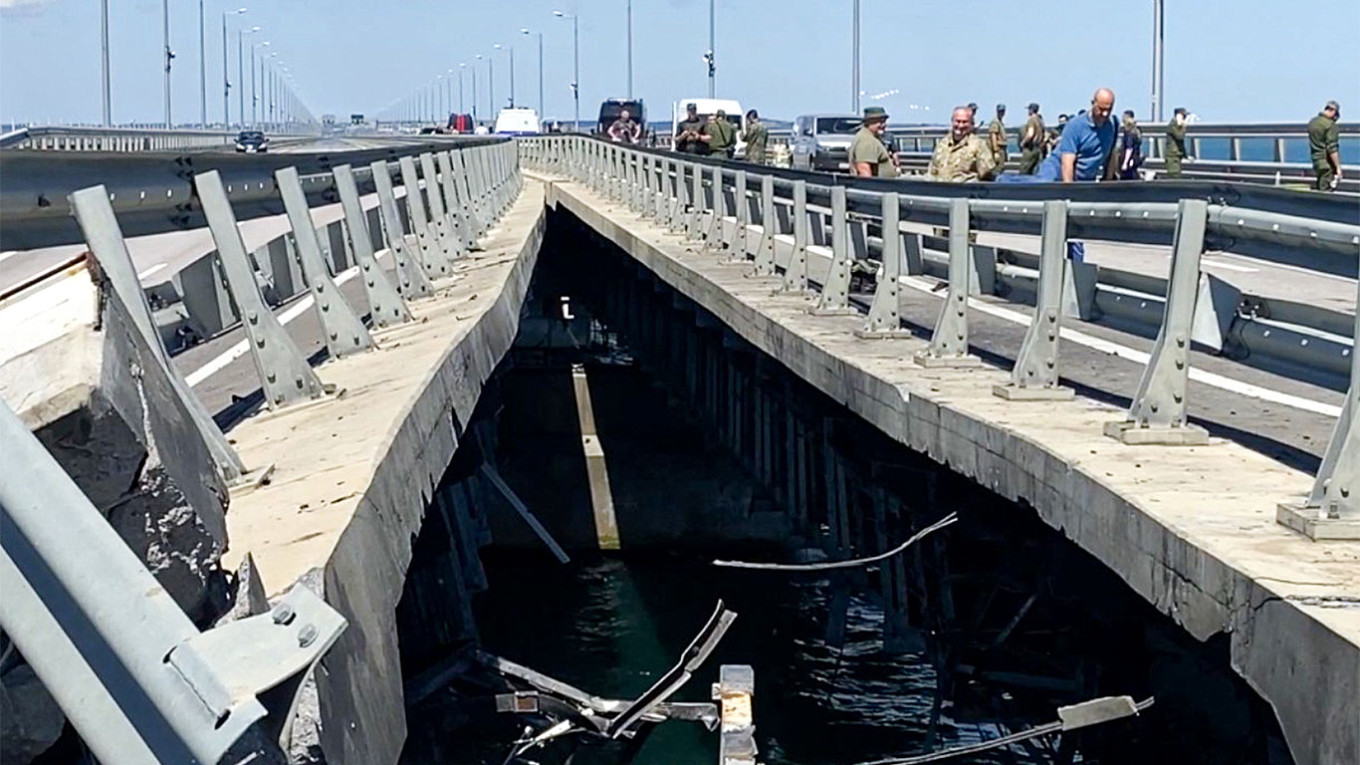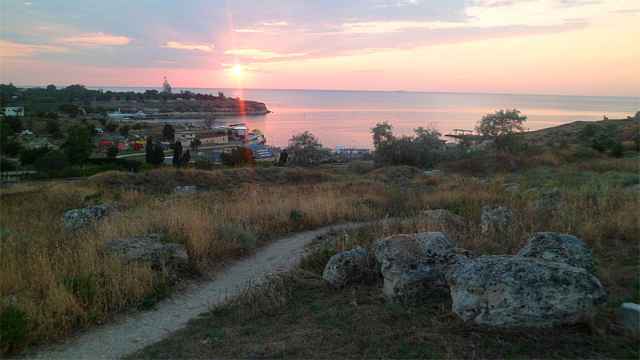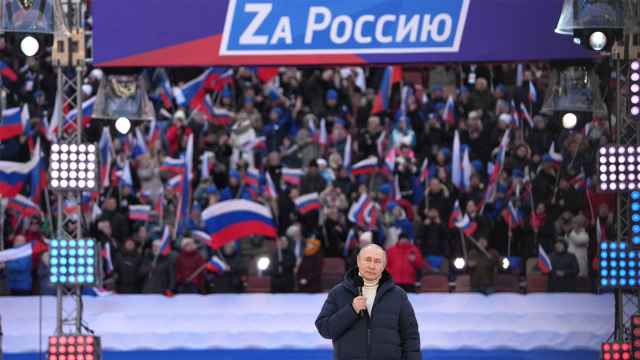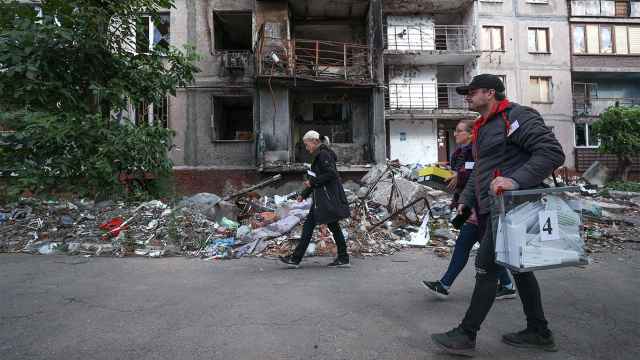Monday's strike on the sole bridge connecting mainland Russia to annexed Crimea, the second attack in 10 months, has been met with little surprise among Russian political and business elites despite killing two people and disrupting a key transit link.
As the war in Ukraine drags on, the Crimea bridge — which takes both Russian military supplies and summer vacationers to and from the Black Sea peninsula — has become a high-profile military target.
But while the October 2022 explosion that tore the bridge apart elicited shock and astonishment in Moscow, the recent deadly drone strike appears to have been received with a collective shrug.
"I don't see much of a reaction now. It may sound cynical, but [these attacks] have already become routine," a Russian government official told The Moscow Times, speaking on condition of anonymity.
"I reacted calmly. I think the response would have been worse if we had ceded Bakhmut, for example," an insider close to the Kremlin told The Moscow Times, referring to the eastern Ukrainian city that was the site of the longest battle of the war.
Among Russian business executives, "there seems to be no shock anymore. We've gotten used to it," a member of Russia's business circles told The Moscow Times by phone.
In a routine meeting with security and construction officials Monday afternoon, President Vladimir Putin vowed that Russia would retaliate against Ukraine and ordered Russia's special services to boost the bridge’s security.
“The Defense Ministry is drafting proposals [for retaliatory actions],” Putin said.
All three of The Moscow Times' sources said they believed that the Kremlin's main — and only — response was likely to be a renewed wave of aerial strikes on Ukrainian cities, as it has done in the past.
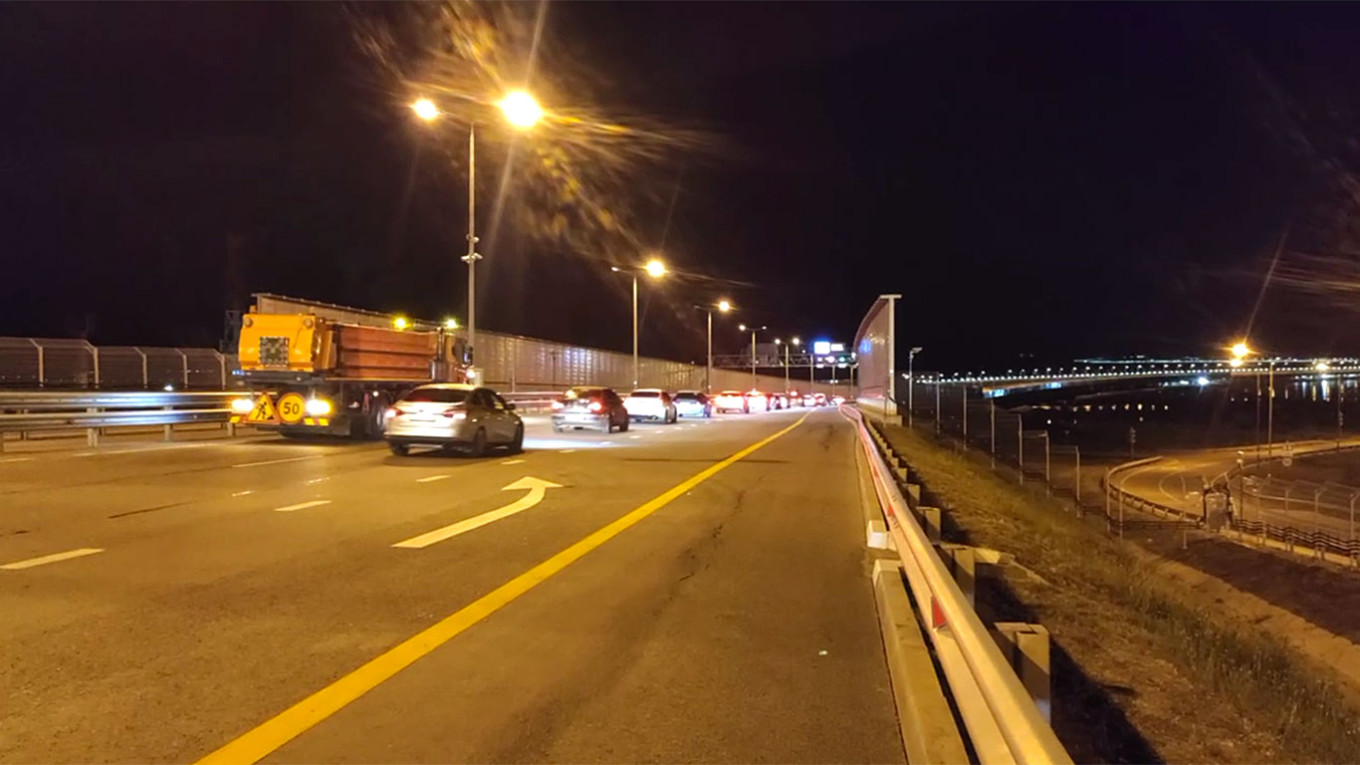
Early Tuesday, Ukrainian officials said a flurry of Russian drone and missile attacks on Ukraine’s southern coast had damaged port and industrial infrastructure near the city of Odesa. Russia said it carried out a "retaliation strike" against sites that it claimed were involved in planning the attack on the bridge to Crimea.
For Russia, the consequences of what Putin called a “terrorist act” are both humanitarian and strategic in nature, as the Crimea bridge is a major logistics artery for civilian and Russian military cargo alike.
The Russian army supplies its forces in southern Ukraine’s Kherson and Zaporizhzhia regions via the Crimean peninsula.
Simferopol International Airport, Crimea’s only civilian air transit hub, has been out of service since Moscow launched its invasion in February 2022, thus giving the bridge even greater importance as the peninsula’s main road and rail artery.
The October 2022 attack on the bridge came as a shock to the Kremlin, with Putin personally promising to restore it by the start of this year's tourist season as well as to beef up security. Now, the highway across the Kerch Strait is once again out of regular service.
So far this summer, traffic on the bridge has been repeatedly disrupted due to the looming threat of aerial strikes. Because of this, travelers have been forced to wait in traffic jams stretching for several kilometers.
Tourism, a key driver of the region’s economy, has been brought to a near-standstill, with many hotels on the coast left empty due to anxieties over the nearby war and Ukraine’s ongoing counteroffensive.
In early June, Crimea’s Russian-installed Governor Sergei Aksyonov admitted that “this year, we will spend the season in a reduced format.”
The Russian government spent billions of dollars to build the bridge to Crimea and to provide for its security.
However, the war has jeopardized both the safety and well-being of the region's residents, who were promised a better life by the Kremlin when it annexed the peninsula in 2014.
Independent experts said the latest attack underscores Putin’s political and military weakness and failure to provide a stable link to the region.
It is increasingly difficult for Moscow to talk about the Kremlin's commitments to its occupied territories as the war drags on, Yevgeny Roshchin, a researcher at Princeton University, told The Moscow Times.
"I doubt that people there seriously count on them, given the previous bridge bombing and regular drone strikes. This is the new normal for people. They will curse their hearts out and wait for the spans to be rebuilt, or for the flow of tourists over land," Roshchin said.
According to Oleg Ignatov, a senior analyst at the International Crisis Group, all of this plays into Ukraine’s strategy.
“Ukraine seeks to completely cut off travel routes between Crimea and Russia. Or to make it risky and inconvenient," Ignatov told The Moscow Times.
"Welfare, security and other obligations to Crimeans? This is a war, and it has consequences,” he said.
A Message from The Moscow Times:
Dear readers,
We are facing unprecedented challenges. Russia's Prosecutor General's Office has designated The Moscow Times as an "undesirable" organization, criminalizing our work and putting our staff at risk of prosecution. This follows our earlier unjust labeling as a "foreign agent."
These actions are direct attempts to silence independent journalism in Russia. The authorities claim our work "discredits the decisions of the Russian leadership." We see things differently: we strive to provide accurate, unbiased reporting on Russia.
We, the journalists of The Moscow Times, refuse to be silenced. But to continue our work, we need your help.
Your support, no matter how small, makes a world of difference. If you can, please support us monthly starting from just $2. It's quick to set up, and every contribution makes a significant impact.
By supporting The Moscow Times, you're defending open, independent journalism in the face of repression. Thank you for standing with us.
Remind me later.



